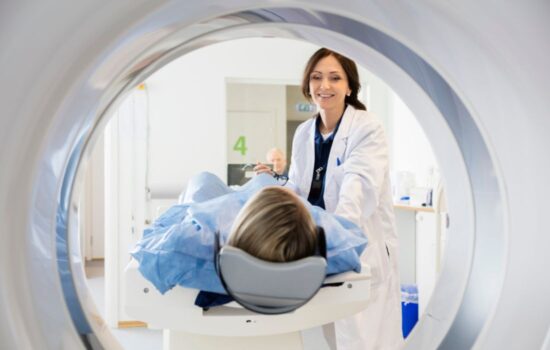December 29, 2023
When To Get Screened for Lung Cancer

Lung cancer usually doesn't cause symptoms, which means it can go undetected for quite some time. In fact, many times, lung cancer is found on x-rays when a doctor runs tests for a different health concern! Is there a better way? For some people with a smoking history, there is a more precise process to screen for signs of lung cancer.
Screening makes it possible to catch and diagnose lung cancer earlier, when it's easier to treat. But what exactly does lung cancer screening entail, and how do you know if it’s right for you?
Understanding the Lung Cancer Screening Test
A low-dose computed tomography (LDCT) scan is the standard lung cancer screening method. An LDCT is a safe and painless procedure that takes multiple, detailed photos of the inside of the body using an X-ray machine that scans in a spiral path.
The advanced technology of LDCT can detect areas of concern sooner than a standard X-ray, which has led to improved patient outcomes.
Lung CT scans are outpatient procedures that do not require a hospital stay. They are also non-invasive, requiring no anesthesia or surgery.
Who Is Eligible for Lung Cancer Screening?
Lung cancer screening is primarily for those who are at the highest risk of developing it. According to the US Preventive Services Task Force (USPSTF), annual lung cancer screening is recommended if:
You are between 50 and 80 years old, and
You have a “20-pack-year” smoking history (1 pack a day for 20 years, 2 packs a day for 10 years, etc.), and
You smoke currently or have quit within the past 15 years
Lung cancer screening is not recommended if you:
Are above the age of 80
Have not smoked in more than 15 years
Would not be able or willing to have lung cancer treatment, including surgery or chemotherapy, if cancer is diagnosed.
Talk with your primary care doctor to see if you qualify for a lung cancer screening test based on the above criteria. If you do, most insurance plans, including Medicare, cover lung cancer screening.
Benefits of Lung Cancer Screenings
The main benefit of lung cancer screening is early detection, which can lower your risk of dying from lung cancer. Treatments can be started sooner than if you wait until symptoms appear. At that point, the cancer has usually grown to a later stage when it is usually more challenging to treat. It may also mean fewer treatments are needed. For example, surgery may be all that’s required for patients with early-stage lung cancer compared to the combination of several treatments and surgery when found later.

Deciding If Lung Cancer Screening is For You
Remember, the most important benefit of lung cancer screening is the ability to identify the disease before it progresses to a later stage.
Know the symptoms of lung cancer.
If lung cancer is caught before it spreads throughout the body, it’s much easier to treat. As with most medical tests, however, there are some potential risks that qualified individuals should be aware of.
Inaccurate screening test results. Although many patients have received better outcomes due to screening, it’s important to understand that no medical test is entirely accurate, and in some cases, results can be misread. An example is receiving either a “false-positive” or a “false-negative” result. A false-positive test result means that your lungs appear abnormal even though they are clear of cancer. On the other hand, a false-negative test result means that your lungs seem to be normal even though lung cancer is present.
Unfortunately, either type of result can pose potential problems. A false positive could cause unnecessary stress and concern. At the same time, a false-negative could result in not getting the treatment you need until your next screening or until you develop symptoms
Overexposure to radiation. Although the CT scans used for lung cancer are performed with low levels of radiation, repeated exposure could cause cancer. In most cases, the risk of radiation exposure for screening outweighs the risk of developing cancer. Still, talking with your doctor about concerns about overexposure to radiation is essential. Your doctor can guide you on reducing any potential side effects from repeated scans. This often involves exposing you to low-dose screenings only when necessary.
Unforeseen findings. Lung cancer screening scans take pictures of other areas of the body, not just the lungs, which could detect other health problems. This may be a good thing if it’s a health issue you aren’t aware of. However, it likely means additional tests, which can cause stress. Findings such as this also include what is known as overdiagnosis. When the scan results lead to diagnosing and treating a disease, such as a nodule, mass, or nonaggressive cancer, that may never have caused symptoms or become life-threatening.
Next Steps for Lung Cancer Screening
Talk to your doctor about your level of lung cancer risk and if you are a candidate for lung cancer screening. Your doctor can help you make the right choice based on your situation.
Remember, lung cancer can only be detected, not diagnosed with screening. If something suspicious is found, a biopsy is likely the next step. That’s the test to confirm if cancer is present. If the biopsy confirms cancer, you will see a medical oncologist who will run diagnostic tests to accurately determine the specific type of lung cancer and its stage.
Lung Cancer Treatment Specialists Throughout Brevard County, Florida
The thought of lung cancer can be scary. If you have received a positive result of lung cancer, the next step will be to consult with a lung cancer specialist who can talk to you about your available treatment options. If you live in the Brevard County area, contact the lung cancer specialists at Cancer Care Centers of Brevard. We offer our patients access to the latest lung cancer treatments at our Palm Bay, Melbourne, Merritt Island, and Rockledge, Florida offices. We also provide access to clinical trials through our Brevard County locations.
Categories: Lung Cancer, Cancer Screening